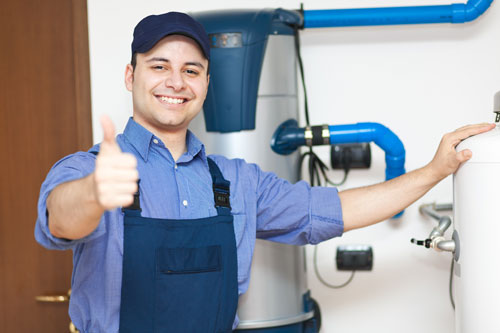How To Fix Standard Water Heater Issues
How To Fix Standard Water Heater Issues
Blog Article
Just about everyone may have their own unique idea on the subject of Common Problems with Your Home Water Heater.

Think of starting your day without your regular hot shower. That already sets a poor tone for the rest of your day.
Every house needs a trustworthy water heater, yet just a couple of understand exactly how to manage one. One very easy method to maintain your water heater in top form is to check for faults frequently and repair them as quickly as they show up.
Keep in mind to shut off your hot water heater before smelling around for faults. These are the water heater mistakes you are more than likely to experience.
Water also hot or too chilly
Every water heater has a thermostat that establishes how hot the water gets. If the water coming into your residence is as well warm in spite of establishing a hassle-free maximum temperature, your thermostat may be defective.
On the other hand, too cold water may be due to a fallen short thermostat, a damaged circuit, or improper gas circulation. For instance, if you use a gas hot water heater with a damaged pilot light, you would certainly get cold water, even if the thermostat remains in best condition. For electric heaters, a blown fuse might be the perpetrator.
Not enough hot water
Water heaters come in several sizes, depending upon your warm water needs. If you run out of hot water before everyone has actually had a bath, your water heater is as well tiny for your family size. You should think about mounting a bigger hot water heater tank or choosing a tankless water heater, which occupies much less room and also is a lot more sturdy.
Strange sounds
There go to the very least five type of sounds you can hear from a hot water heater, however the most typical interpretation is that it's time for the hot water heater to retire.
First off, you need to be familiar with the typical sounds a water heater makes. An electrical heating unit might appear different from a gas-powered one.
Standing out or banging noises normally suggest there is a piece of sediment in your containers, and also it's time to clean it out. On the other hand, whistling or hissing noises might simply be your shutoffs allowing some pressure off.
Water leaks
Leakages can come from pipes, water connections, valves, or in the worst-case scenario, the storage tank itself. Over time, water will wear away the storage tank, as well as discover its escape. If this takes place, you need to change your water heater as soon as possible.
Nevertheless, prior to your change your entire container, make sure that all pipes are in place which each shutoff functions completely. If you still require aid determining a leakage, call your plumber.
Rust-colored water
Rust-colored water suggests among your water heater elements is corroded. It could be the anode pole, or the container itself. Your plumber will have the ability to identify which it is.
Lukewarm water
No matter how high you established the thermostat, you will not obtain any type of warm water out of a heater well past its prime. A hot water heater's performance may decrease with time.
You will additionally obtain lukewarm water if your pipelines have a cross connection. This means that when you turn on a faucet, warm water from the heating unit flows in along with normal, cold water. A cross connection is easy to spot. If your warm water faucets still follow closing the hot water heater shutoffs, you have a cross connection.
Discoloured Water
Corrosion is a significant source of dirty or discoloured water. Rust within the water container or a stopping working anode rod could cause this discolouration. The anode rod safeguards the container from rusting on the within and also need to be inspected yearly. Without a rod or an appropriately working anode pole, the warm water swiftly wears away inside the container. Call a professional hot water heater service technician to determine if changing the anode pole will certainly fix the problem; if not, replace your hot water heater.
Final thought
Preferably, your hot water heater can last one decade before you need a change. Nonetheless, after the 10-year mark, you might experience any of these mistakes a lot more on a regular basis. At this moment, you should include a brand-new water heater to your budget.
How To Troubleshoot 3 Common Water Heater Problems in Twin Cities
The Water Heater Is Leaking
A leaky cold water inlet valve A loose pipe fitting A leaky temperature and pressure relief valve A corroded anode rod A cracked tank Turn Off Your Water Heater:
Shut off your gas water heater by turning the gas valve on the unit to the “OFF” position. Shut off your electric water by switching its power off at your electrical panel. Look for a two-pole breaker labeled “water heater” and turn it to the “OFF” position. Move the ball valve connected to the water heater to be perpendicular to the piping at a 90° angle. Look for the Leak:
Depending on whether the water is coming from the tank's top or bottom, you’ll want to look for the leak in different locations.
If the leak comes from the top of the tank, carefully look for water escaping from the cold water inlet valve or loose pipe fittings. Rusted hot and cold water valves can have loose connections with the tank, with water leaking out of them.
https://mspplumbingheatingair.com/blog/how-to-troubleshoot-3-common-water-heater-problems
I came across that article about Water Heater Repair and Troubleshooting when doing a lookup on the search engines. Are you aware of somebody else who is fascinated with the subject? Why not share it. Thanks a bunch for your time. Come back soon.
Precision and quality here. Report this page